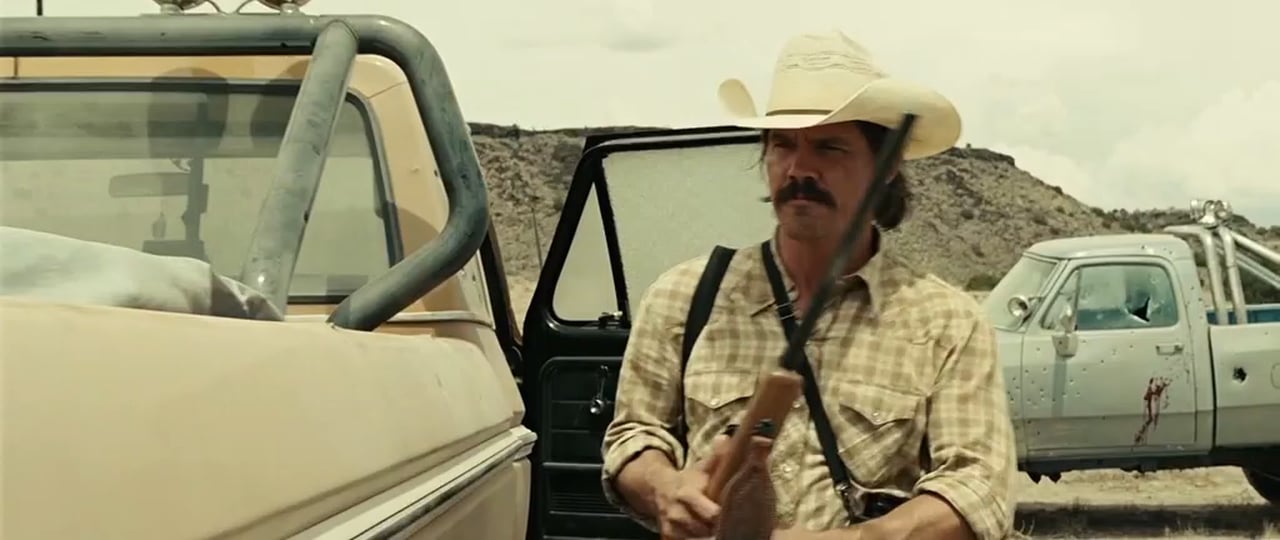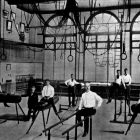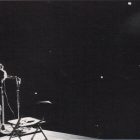Book vs. Movie: No Country for Old Men

This is the second in a series of posts entitled 21st Century Fiction on Screen. In each entry I’ll be comparing a contemporary novel to its film adaptation. See the first entry here.
If, while watching a movie with your spouse, you like to whisper “that didn’t happen in the book” (and who doesn’t?), then you’ll be sorely disappointed by a screening of No Country for Old Men. Virtually every scene and every line of dialogue in the Coen brothers’ Academy Award-winning film is lifted straight from Cormac McCarthy’s 2005 novel of the same name.
One might suspect that McCarthy had a hand in ensuring the film adaptation stayed faithful, but in fact he had almost no role in the Coens’ production. “They didn’t need any help from me to make a movie,” McCarthy said in an interview with the Wall Street Journal.
He’s certainly right in that assessment. The Coens knew what they had in McCarthy’s story, and they knew his setting would translate to the screen. The stark and seemingly endless Texas floodplains Llewelyn Moss (Josh Brolin) surveys as he aims a rifle or plots an escape through a river practically demand to be captured on camera. As readers, there’s only so much our imaginations can do, although McCarthy’s delicious language is a picture unto itself: “The light of the unseen moon before him spread out along the dark placard hills like scrimlights in a theatre.” He has the best words, as some would say.
If we turn to cinema for images, we look to prose to examine a character’s mind and soul. Every chapter of No Country for Old Men begins with an extended meditation from Ed Tom Bell, the aged sheriff who oversees the investigation into the myriad crimes at the heart of the novel. He laments how law enforcement, and people generally, have changed over his lifetime, and questions whether there has even been a point to his life’s work (“I always thought I could at least someway put things right and I guess I just dont feel that way no more.“).
The film gives a nod to these character notes. Tommy Lee Jones’s Bell does complain (as he does in the novel) that no one says “sir” or “ma’am” anymore, and expresses a few other sentiments of the “get off my lawn” variety. But the Coens’ script lands in a different place with Bell’s jadedness. Near the end of the narrative, Bell visits his uncle Ellis, an infirm former deputy who recounts a story about another uncle who’d been gunned down nearly a century earlier. In the film, Ellis tries to explain away Bell’s ennui by telling him that the story illustrates how things have always been the same, and the present day only seems worse.
A reader of the novel could choose to draw the same conclusion, but Ellis himself doesn’t—and he doesn’t have any great wisdom for Bell either. Instead, his comments throughout their chat express a deep dissatisfaction with his own life’s trajectory. “I dont know what I’m doin here still knockin around,” he says. “All them young people. We dont know where half of em is even buried at. You got to ask what was the good in all that,” he says. “There aint no point to it. Not to any of it,” he says.
The idea that we have no control over our lives, and that we only become more aware of this situation with age, is at the heart of McCarthy’s novel. The film, however, seems to resist this notion. One of the only places where the Coens tinker with the plot occurs in the final confrontation between the archvillain Chigurh (Javier Bardem) and Carla Jean Moss (Kelly Macdonald), our protagonist’s wife. (Caution: massive SPOILERS follow.) Chigurh lets Carla Jean flip a coin to potentially save her life, and in the book, Carla Jean chooses heads, loses, and gets killed. In the movie, however, Carla Jean refuses to take the coin flip (or if she does, it happens off-screen), and Chigurh kills her only because he’s following his own strange moral code. We’re left wondering if, to preserve his principles, he might’ve killed her even if she’d won the coin toss. In the book, lives are ruled by randomness. It seems plausible that McCarthy himself flipped a coin to determine Carla Jean’s fate.
The human impulse to create stories out of the events that make up our histories helps fight off the terrifying possibility that we are where we are for no good reason at all. McCarthy’s novel faces up to that horror, and it’s even worse than imagined. The Coen Brothers, for all that their riveting and panoramic film accomplishes, can’t resist pairing cause and effect.



